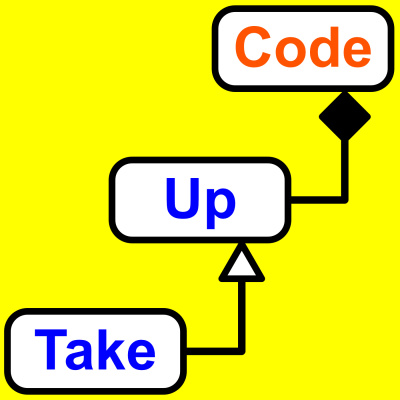Sinopsis
Take Up Code is a podcast that explains computer programming topics through fun and engaging examples that you can relate to. The guided format allows you to gain valuable understanding of topics that will reinforce your studies, allow you to train new skills that you can apply on your job, and change your thinking about what it takes to become a professional programmer. The episodes are as short as possible so you can squeeze them into your daily routine.
Episodios
-
QA Friday 2016-Aug-05
05/08/2016 Duración: 08minRegulations say that you can only have one floor mat.
-
142: Comments. Focus On Why.
01/08/2016 Duración: 09minComments are important but do not forget that your code should also be self-commenting.
-
QA Friday 2016-Jul-29
29/07/2016 Duración: 09minWhere are your certifications? Do you have a degree?
-
141: Reference Counting. Still In Use!
25/07/2016 Duración: 13minCan this object be thrown away yet? Keeping track of how many places are still using an object is one way to answer this question.
-
QA Friday 2016-Jul-22
22/07/2016 Duración: 09minWhat is your biggest weakness? Things around us change and we each grow and change too.
-
140: Name Mangling and Overloaded Methods.
18/07/2016 Duración: 09minYou normally do not have to worry about name mangling. But you should know what it is.
-
QA Friday 2016-Jul-15
15/07/2016 Duración: 07minWhat is your biggest weakness? In real life, problems often require more than one person. Nobody can be an expert in everything. We have to each focus on what we do best and that means we need weaknesses.
-
139: Data Types: C++ Decltype. Declared Types.
11/07/2016 Duración: 09minSometimes you need to declare a type to be the same as something else.
-
QA Friday 2016-Jul-08
08/07/2016 Duración: 06minHow our education system ignores problem solving. I do not really have a question this week so this is a great opportunity for me to talk about education.
-
138: Data Types: Lvalues And Rvalues.
07/07/2016 Duración: 10minYou will sometimes come across lvalues and rvalues maybe when trying to understand compiler error messages or when reading docs. A basic understanding will go a long way to making sense of them.
-
137: Data Types: Auto or Var. The Compiler Chooses.
06/07/2016 Duración: 09minAuto and var types do have a type. The compiler will figure out what that is.
-
136: Data Types: Variant. Pick One.
05/07/2016 Duración: 07minThe variant type can take on one of many different types and can even change the type. It is still a variant so it is more accurate to say that it can hold another type.
-
135: Data Types: GUIDs Globally Unique Identifiers.
04/07/2016 Duración: 09minWhen you want to identify class instances or data records, you cannot use things like passports. Yet it is just as important to keep track of object identities as it is for people.
-
QA Friday 2016-Jul-01
01/07/2016 Duración: 09minI always feel pressure and embarrassment when doing code reviews. What should I do?
-
134: Data Types: C++ Function Binders.
30/06/2016 Duración: 08minBinders make up part of functional composition that allows you to adapt functions and combine them into new functions.
-
133: Data Types: Regular Expressions.
29/06/2016 Duración: 10minA regular expression or regex lets you perform the advanced text operations matching, searching, tokenizing, and replacing.
-
132: Data Types: Lambdas.
28/06/2016 Duración: 11minLambdas are a recent addition to C++ and are also included in other languages. Think of them like unnamed methods but with some extra concepts that you need to know. Or if not, you will be even more lost than with function pointers.
-
131: Data Types: Function Pointers Part 2.
27/06/2016 Duración: 13minYou may not always need to work with this data type but that does not mean you can ignore it. If you do not at least know the basics, then you will get lost in code that uses function pointers.
-
-
130: Data Types: Function Pointers Part 1.
23/06/2016 Duración: 08minYou may not always need to work with this data type but that does not mean you can ignore it. If you do not at least know the basics, then you will get lost in code that uses function pointers.

































